|
|
|
Sort Order |
|
|
|
Items / Page
|
|
|
|
|
|
|
| Srl | Item |
| 1 |
ID:
161653
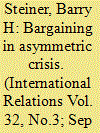

|
|
|
|
|
| Summary/Abstract |
Diplomacy, defined as formal communication and bargaining between states, is subject to limits that diplomatic theory must demarcate and understand. This article compares state incentives and disincentives (including rejection of negotiation as well as refusal to concede) affecting the decision whether to negotiate in six cases of interstate crisis between militarily unequal antagonists. While it has been argued that asymmetric powers are more likely to reach negotiating agreement than their symmetric counterparts, with weaker states doing surprisingly well, that finding is questioned here in the crisis context. For example, the militarily inferior antagonist, attracted to diplomacy as an alternative to war, might well anticipate inferior results from direct negotiations. The weaker antagonist’s unwillingness in these cases to negotiate with a strong opponent suppressed diplomacy, but great power support for the weaker side, and the stronger power’s lack of war readiness, added to the stronger antagonist’s willingness to negotiate.
|
|
|
|
|
|
|
|
|
|
|
|
|
|
|
|
| 2 |
ID:
161651
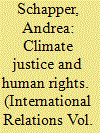

|
|
|
|
|
| Summary/Abstract |
Climate change as well as climate policies can have adverse effects on the human rights of certain population groups – and can exacerbate situations of injustice. As it stands today, the human rights regime is not set to sufficiently address these situations of climate injustice. In this article, I suggest a systematization of the normative climate justice literature that can be used as an analytical framework to evaluate current developments in human rights law and policy, and their potential to diminish inter-national, intra-societal and inter-generational climate injustice. I argue that further advancing procedural and substantive human rights obligations and corresponding enforcement mechanisms constitute one important way of establishing climate justice practices. Moreover, I suggest that the normative climate justice literature can be fruitfully used in International Relations to evaluate policy developments at the intersection between climate change and other policy fields.
|
|
|
|
|
|
|
|
|
|
|
|
|
|
|
|
| 3 |
ID:
161655
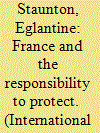

|
|
|
|
|
| Summary/Abstract |
Although France has been a key actor of human protection since the 1980s, the existing literature often adopts an Anglo-Saxon focus or concentrates on states which have been reluctant to see international norms of human protection develop. As a consequence, it overlooks France’s central role in the development of the Responsibility to Protect (R2P), which can be seen as the leading norm of human protection today. In turn, the growing influence R2P has had on France’s conception and practice of human protection – and on its foreign policy more generally – remains unexplored. This article is the first of its kind to correct these oversights by examining France’s relationship to R2P from its emergence till date. It argues that to do so, we need to analyse the evolving relationship of two interconnected – yet distinct – norms: France’s domestic norm of human protection on the one hand, and the international norm of R2P on the other. It builds on the constructivist literature to offer a theoretical framework that allows the study of this tale of two norms and draws upon elite interviews of key actors such as Gareth Evans and Bernard Kouchner to provide a unique understanding of France’s relationship to R2P. Through this tale of two norms, the article reshapes our understanding of both R2P and France’s past and current foreign policy. In addition, it contributes to the literature on norm diffusion, in particular by deepening our understanding of how domestic and international norms interplay.
|
|
|
|
|
|
|
|
|
|
|
|
|
|
|
|
| 4 |
ID:
161654
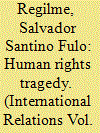

|
|
|
|
|
| Summary/Abstract |
How and to what extent do ideas and political discourses shape bilateral cooperation between a powerful state and its weaker ally? Why do weaker states act in ways that diverge from the expectations and preferences of the powerful state despite the contractual agreement borne out of bilateral cooperation? Drawing perspectives from constructivism and principal–agent framework, this article provides a conceptual-interpretative analysis of post-9/11 counterterror cooperation of the US government with Colombia – America’s long-standing ally in the region. The case study shows that the provision of security is not only conceived in the domestic levels but also produced in the transnational sphere; that security provision is not only a materially oriented political activity but also an ideational-discursive exchange where political actors legitimize and facilitate interstate cooperation; and, finally, that the power of dominant states is not only produced from within them but strategically reconstituted by weaker powerful states.
|
|
|
|
|
|
|
|
|
|
|
|
|
|
|
|
| 5 |
ID:
161652
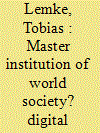

|
|
|
|
|
| Summary/Abstract |
In English School theory, the putative change from an international society of states to a world society of individuals is usually associated with the diffusion of a benign form of cosmopolitanism and the normative agenda of solidarism. Consequently, the notion that world society might enable alternative expressions of transnational politics, independent from international society, remains underdeveloped. Drawing on the literature of contentious politics and social movements, this article challenges orthodox accounts and suggests that the global proliferation of digitally mediated linkages between individuals and nonstate actors constitutes a fundamental challenge to traditional dynamics of interstate communication in the form of the diplomatic system. This provides an opportunity to reconceptualize world society as an alternative site of politics distinct from mainstream international society and generative of its own logic of communication, mobilization, and action. The 2011 events in Egypt and the ongoing digital presence of the so-called Islamic State are used to demonstrate how massive increases in global interaction capacity are transforming the pathways for political contention and collective mobilization worldwide.
|
|
|
|
|
|
|
|
|
|
|
|
|
|
|
|
| 6 |
ID:
161650


|
|
|
|
|
| Summary/Abstract |
Both within political theory and International Relations (IR), recent scholarship has reflected on the nature and limits of political realism. In this article, we return to the thermonuclear revolution and the debates it spurred about what was real and possible in global politics. We argue that a strand of oppositional and countercultural thinking during this period, which we refer to as realist radicalism, has significant theoretical and practical relevance for current scholarship on political realism. Indeed, debates during the thermonuclear revolution speak to questions about the nature of realism and whether it is possible to develop a realism that is attuned to progressive or emancipatory ambitions. By focusing mainly on two radical American intellectuals – C. Wright Mills and Lewis Mumford – we show how their responses to the thermonuclear, superpower standoff challenged conventional understanding of realism and utopianism. By harnessing the concept of the imagination, they called into question pre-existing conceptions about politics and reality. The contribution of the article is twofold. First, we argue that realist political theory and IR should pay more attention to thinkers that are not conventionally regarded as canonical but whose writings and politics interrogated the limits and potential of political realism. Second, we demonstrate that the work of such public intellectuals and their calls for cultivating the imagination connect directly to current debates about political realism, including its statist bend and its (purported) conservatism.
|
|
|
|
|
|
|
|
|
|
|
|
|
|
|
|
|
|
|
|
|